
thread connector. If this connection is not compatible with the plumbing of the existing installation, a variety of connectors are available from good hardware stores and plumbers merchants to suit most domestic plumbing. Any alteration to your existing plumbing must be carried out by a competent person, or qualified plumber.
Water inlet
An inlet hose is supplied and can been found inside the machine drum.
Do not use the hose from your previous washing machine to connect to the water supply.
1.Open the porthole and extract the inlet hose .
2.Connect the hose with the angled connection to the machine.
A |
HEC0024 |
3.Remove the security gasket cup by turning and pulling it away. Pay attention not to move or remove the gasket.
P0351
Important!
Do not place the inlet hose downwards. Angle the hose to the left or right depending on the position of your water tap.
4.Set the hose correctly by loosening the ring nut. After positioning the inlet hose, be sure to tighten the ring nut again to prevent leaks.
5.Connect the hose to a tap with a 3/4” thread. Always use the hose supplied with the appliance.
A![]()
P0352
The inlet hose is provided with a water stop device, which protects against damage caused by water leaks in the hose which could develop due to natural ageing of the hose. This fault is shown by a red sector in the window “A”. Should this occur, turn the water tap off and refer to your Service Centre to replace the hose. Installation should comply with local water authority and building regulations’ requirements.
The appliance must be connected to a cold water supply.
A minimum water pressure of 0.5 bar is required for safe operation of the appliance.
If you cannot make the cold water connection direct from the rising mains, you may be able to operate the appliance from your cold water storage system.
There should be a minimum vertical distance of 5.02m (16.5 ft) between the appliance’s inlet and the bottom of the water storage tank.
Water drainage
This appliance is designed to be permanently plumbed into your home's drainage system using one of the following methods.
1. Into a drainage standpipe.
Firstly form a hook in the end of the drain hose using the “U” piece” supplied.
“U” piece supplied
P1199
Place the drain hose into your standpipe, which should have an internal diameter of approximately 38mm thus ensuring there is an air break between the drain hose and standpipe.
24
